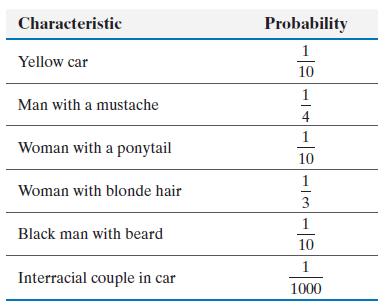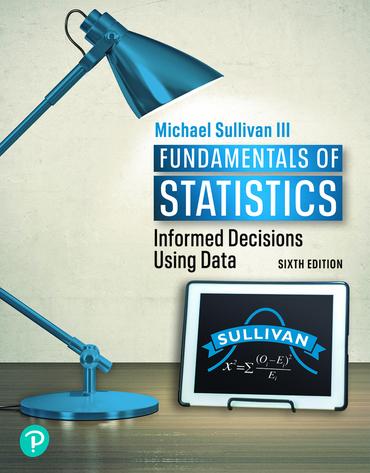A woman who was shopping in Los Angeles had her purse stolen by a young, blonde female
Question:
A woman who was shopping in Los Angeles had her purse stolen by a young, blonde female who was wearing a ponytail. The blonde female got into a yellow car that was driven by a black male who had a mustache and a beard. The police located a blonde female named Janet Collins who wore her hair in a ponytail and had a friend who was a black male who had a mustache and beard and also drove a yellow car. The police arrested the two subjects.
Because there were no eyewitnesses and no real evidence, the prosecution used probability to make its case against the defendants. The probabilities below were presented by the prosecution for the known characteristics of the thieves.

(a) Assuming that the characteristics listed are independent of each other, what is the probability that a randomly selected couple has all these characteristics? That is, what is P (“yellow car” and “man with a mustache” and cand “interracial couple in a car”)?
(b) Would you convict the defendants based on this probability? Why?
(c) Now let n represent the number of couples in the Los Angeles area who could have committed the crime. Let p represent the probability that a randomly selected couple has all six characteristics listed. Let the random variable X represent the number of couples who have all the characteristics listed in the table. Assuming that the random variable X follows the binomial probability function, we have![]()

Assuming that there are n = 1,000,000 couples in the Los Angeles area, what is the probability that more than one of them has the characteristics listed in the table? Does this result cause you to change your mind regarding the defendants’ guilt?
(d) Now let’s look at this case from a different point of view. Compute the probability that more than one couple has the characteristics described, given that at least one couple has the characteristics.
Compute this probability, assuming that n = 1,000,000. Compute this probability again, but this time assume that n = 2,000,000. Do you think that the couple should be convicted “beyond all reasonable doubt”? Why?
Step by Step Answer:






